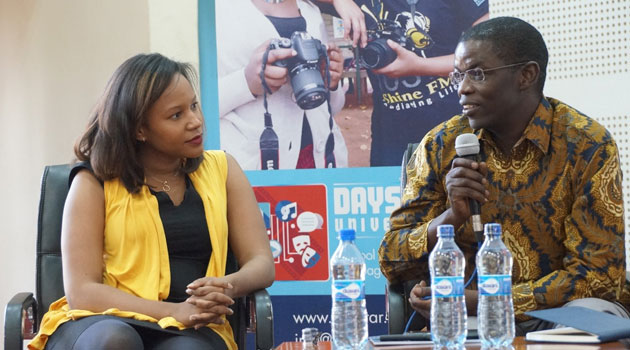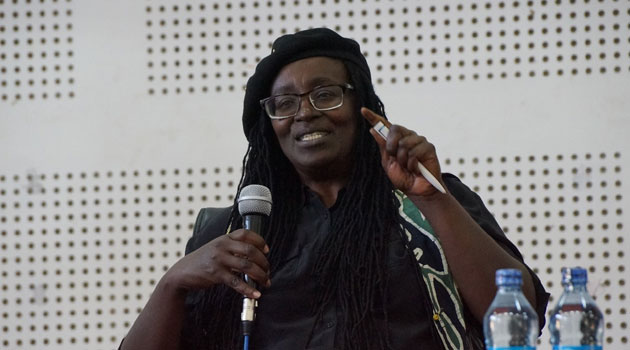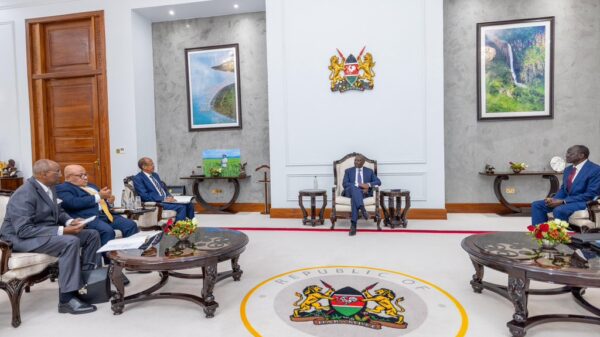
Or was it, as put by the Dean of the School of Communication, Language and Performing Arts Levi Obonyo, a case of discrediting the messenger so as to discredit the message which poses a threat to the Establishment/MUTHONI NJUKI
NAIROBI, Kenya, Feb 12 – The critically acclaimed film ‘The Post’ starring Academy Award winners Meryl Streep and Tom Hanks and directed by the legendary Steven Spielberg, was described in Time Magazine’s review of 2017 as the most important of the year.
Spielberg is himself quoted as saying, “when I read the first draft of the script, this wasn’t something that could wait three years or two years — this was a story I felt we needed to tell today.”
Today being a time when over 150 Journalists and Editors have been labeled terrorists in Turkey’s courts, for “subliminally” abetting treason by their criticism of Recep Erdogan’s regime.
A time when the current occupant of the office of ‘the leader of the free world’ has displayed open hostility toward the free press and right at home, three of the biggest broadcasters taken off-air for over a week for refusing to allow President Uhuru Kenyatta to take up the role of Editor-in-Chief in addition to Commander-in-Chief.
Across the border in Uganda, eight journalists working for the Red Pepper were late last year charged with treason over a story the paper ran and in Tanzania, a newspaper viewed to be opposition leaning was recently taken out of circulation with several other publications suspended by John Magufuli’s administration after it passed a law paving the way for it to take such action on “public safety and national security” grounds.
Still in the course of last year, Magufuli took the side of his ally who stormed a radio station with armed men to demand the airing of incendiary content and fired the concerned Minister when he spoke out against the invasion.
The Post – for those who may not have watched it – is a movie about the time in American History, preceding the Watergate Scandal, when President Richard Nixon sought to stop the press from publishing the content of what are now famously known as the Pentagon Papers.
The Papers detailing how for decades, the US government lied to the American public about its operations and the motives for its actions in the Vietnam War.
The movie is however more about how The Washington Post, at great risk, defended their right to publish and stood in solidarity with the New York Times – which first broke the story – when they took up the cudgels and ran with the story when the Times was prohibited from doing so by the lower courts.
The Supreme Court later in a landmark ruling reaffirmed their right to publish with Judge Hugo Black being quoted as saying: “In the First Amendment the Founding Fathers gave the free press the protection it must have to fulfill its essential role in our democracy. The press was to serve the governed, not the governors. The Government’s power to censor the press was abolished so that the press would remain forever free to censure the Government. The press was protected so that it could bare the secrets of government and inform the people. Only a free and unrestrained press can effectively expose deception in government.”
– Social Media –
An ideal some, such as the CEO of the Kenya Film Classification Board Ezekiel Mutua, view as outdated with the advent of social media.
Responding to the government action against news broadcasters, Mutua – a former Secretary General of the Kenya Union of Journalists – posted on Facebook:
“These days I don’t bother going to the newsrooms unless I am dealing with a friend or someone I respect. I set my agenda in social media and it works. That’s why the mainstream guys are responding to what I post here. Come to think of it; they are not the mainstream. Social media is. Kenyans did not miss much when three tv stations were switched off for a week. We had Twitter, Facebook and other social media platforms. Wake up and smell the coffee you so called mainstream media people!”
READ: Facebook admits social media threat to democracy
At the start of the year, Nation Media Group – one of the three broadcasters government took off-air – announced it would be laying off more of its staff as it struggles to continue to turn a profit in the digital age; and that was before together with Royal Media Services and the Standard Group, who together employ hundreds, they lost hundreds of millions of shillings in the days they were off-air.
It was in this context that a public forum organised by the Political Leadership and Governance Programme Alumni Network was held at the Daystar University to debate whether Kenyan journalists had, as depicted in political cartoons, made the bed they now lay in with the government and whether as a consequence of their mediocrity, earned the derogatory label ‘githeri media’.
Or was it, as put by the Dean of the School of Communication, Language and Performing Arts Levi Obonyo, a case of discrediting the messenger so as to discredit the message which poses a threat to the Establishment.
And how can a free and independent media exist in an environment where, like Turkey and the United States now, Establishment friendly businessmen are encouraged to acquire media interests and control the narrative.
– Content is key –
While it was Obonyo’s position that Kenya has the most robust journalism in the region, Code for Kenya’s Catherine Gicheru conceded that with a few exceptions, it had receded to the ‘he said, she said’ levels with little effort going toward getting to the truth.
A state contributed to, she said, by among other factors budgetary constraints. “Very few newsrooms can now afford to foot the bill for in-depth investigative journalism. Many editors find it impractical to dedicate a team to just one story for weeks.”
Veteran broadcast journalist Christine Nguku and the Media Council of Kenya Deputy CEO Victor Bwire viewed it as a problem of priorities; making the case that ‘Wanjiku’ (ordinary folk) needs to be put back at the centre of the story.
“Journalism is like any other profession, it suffers from quacks. As Christine correctly diagnosed, nowadays you see people enter the profession not for the public good but for the access it offers them. They all want to live in Kileleshwa and drive big cars the minute they walk into a newsroom. How then can you expect them to relate to the Kayole resident for instance?”
Framing the story around how it affects the common man, Gicheru submitted, would win back the hearts of the disillusioned populace.
“Don’t glorify corruption, tell me in terms of policemen that could have been hired, secondary school places that have been lost and medicines that could have been bought, how much that corruption cost me.”
“Don’t bombard me with pedestrian on-air speculation from morning till night; tell me why we’re still paying companies for power they’re no longer generating, why my water has been rationed for the last two years,” Gicheru, the Founding Editor of the Star newpaper and the first female News and Investigations Editor at the Nation, challenged.
Despite its shortcomings, all parties disagreed with Mutua’s “idiotic” by Gicheru’s assessment, view that the country could do without the press.
“Even just looking at it from a purely economic standpoint, it’s not just journalists who work in our media houses; we have accountants, IT experts, drivers, creatives, salesmen, technicians. Many more including those in the advertising world and public relations practitioners are in business because there exists a media. How many more depend on them, including those they hire in their homes, the schools they take their children to… how many billions in taxes do they contribute? The folly of retributive action against the press is reverberative,” Obonyo, also a Communications Authority of Kenya board member and former MCK Chairman, submitted.
READ: Is this how Jubilee intends to create jobs? Civil Society asks of media switch off

While it was Obonyo’s position that Kenya has the most robust journalism in the region, Code for Kenya’s Catherine Gicheru conceded that with a few exceptions, it had receded to the ‘he said, she said’ levels with little effort going toward getting to the truth/MUTHONI NJUKI
– Greater good –
At the end of the The Post, Streep playing the Washington Post’s publisher, says, “We don’t always get it right but I think if we just keep on it, that’s the job.”
And for whatever its shortcomings, Obonyo submitted, the stand taken by the Kenya Editors’ Guild Chairman Linus Kaikai – even without the full support of his colleagues – against government intimidation, is to him proof that the apple may be rotten, but not to the core.
“The reason you saw Kaikai targeted,” the Editors’ Guild Deputy Secretary Hassan Kulundu put forward, “is because as an Editor, he’s a gatekeeper; he decides what makes it to the front page, and if you can’t put him in your pocket, the next best option is to intimidate him into submission.”
The Kenyatta administration has in the past, Kevins Randiek a participant in the forum observed, flexed its advertising muscle in an effort to strong-arm the press into compliance.
And in the interest of keeping the lights on and keeping the presses’ running, Gicheru suggests a more collaborative industry approach to getting to and telling the story.
“We’re going to have to change our business models. The South African outfit that exposed the Gupta state capture was crowdfunded, John-Allan Namu’s Africa Uncensored collaborates with other journalists in the telling of their investigative stories. Why do our three national newspapers all have their printing presses on Mombasa Road and then all have to transport them around the country by road? Why can’t they share them and spread them out cutting the transportation cost?” Gicheru posed.
By her estimation, the means of telling the story may have evolved, but not the need to tell the story. “You can break the story on Twitter but to get to the heart of the story, you’re going to need a journalist.”



































